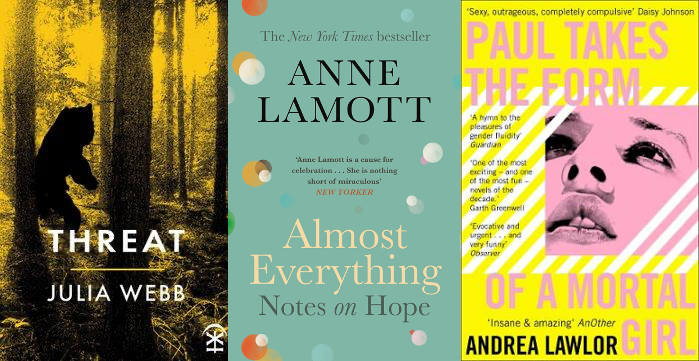How are you? I hope you’re well, I hope you have loved ones near you and are finding some moments of joy in each day. I’m feeling much less anxious than I was a month ago, but being off that merry-go-round means I have more energy to look outward again, and it’s heartbreaking. People are talking less about sourdough and more about how seriously small business are struggling. And even though all the gossip this weekend is about the possible easing of lockdown rules, we are far from out of this mess.
I related strongly to this interview with author Sarah Perry; I’m frustrated that I can’t do more to help, and my work feels a bit pointless in current circumstances, but that feeling is not really valid – people are still reading, and, although many are understandably being more careful with spending, people are still buying books.
By reading, I’m helping publishers in a tiny way. If what I read and recommend tempts you enough to buy a book or recommend one to someone else, then you’re helping in a tiny way too. I don’t want to get political here (that’s impossible, politics is in everything) but please, PLEASE, buy your next book from an independent store or direct from the publisher.
Happy reading, and lots of love <3

Best Poetry: Threat, by Julia Webb (2019, Nine Arches Press). I’ve had Threat on my shelf ever since it came out, but hadn’t got to it yet, and then last week Nine Arches had a special live reading and ‘meet the author’ so it got bumped to the top of the pile. As the title suggests, this is not a rainbows-and-daisies book, and I’ve been rather leaning towards those lately, but it didn’t matter – these poems are so good. There is an unsettled tension running through the book but relief comes from sharply surprising language and some really exquisite lines.
My grief wears me in a pouch
around its neck,
my grief could ward off evil.
My grief is ash on the tongue,
a spent match,
a dog-end picked up from the gutter.
These are poems of danger and of love, of running both away and towards. They are coming-of-age, and family, and navigating the sharp knives the world sometimes comes at us with. It’s a marvellous book and I highly recommend it.
Best Non-fiction: Almost Everything: Notes on Hope, by Anne Lamott (2018, Canongate). I started writing because of Anne Lamott, which sounds exaggerated, but is pretty much true. Back when I was exploring the idea of finally doing something with my long-time dreams of Being A Writer I picked up Bird By Bird, her most famous book, and it was the one that got me out of procrastination and doubt and onto the page. 25 years on, her signature wisdom and down-to-earth attitude returns in this collection of essays about … almost everything. I picked it up by chance at the beginning of March and I was glad to have it when things got a bit grim. Lamott is never sweetly sentimental, she cuts right to it: “Every day we’re in the grip of the impossible conundrum: the truth that it’s over in a blink, and we may be near the end, and that we have to live as it it’s going to be ok, no matter what.” And there are many laugh-out-loud moments: “Most of my spiritual breakthroughs have been against my will.” Chapter four is simply this: “Almost everything will work again if you unplug it for a few minutes, including you.” If you’ve been looking for something to help you believe we’ll get through this ok, and sticky platitudes make you nauseous, then try this instead.
Best Queer Read: Paul Takes the Form of a Mortal Girl, by Andrea Lawlor (2017, first published by Rescue Press). Oh I loved this book so much. I actually signed up to spotify because I wanted the playlist, and if you also grew up in a world of mixtapes, and radio stations that cut out when you drive too far from them, and listening to the same song so often the tape is stretched, then you should buy this book just for that. Paul is gender-fluid, literally. He can transform his body, changing it for a female one, making himself a little taller, or a little more muscled, and he has a lot of fun with it. It’s a delightful next-level take on the eternal narratives of ‘Who am I?’ and ‘Who is like me?’ It’s set in the early nineties, making Paul around the same age as me, and that probably had a lot to do with how much it resonated with me, but I really think anyone might love this book.
That’s it for April, I hope one of these tempts you to try it. May reading is already looking good, and I’ve just had two more dispatch notices in my email inbox, but tell me something you’ve loved lately and I’ll add that to my list too 🙂
Stay well xx
NB: Canongate don’t sell through their website, and Rescue Press is sold out of Paul, so here is the link to Robert McFarlane’s tweet with a list of indie stores that are still delivering books. And if you can’t buy a book at the moment, maybe check out an e-book or audio-book from your library. I was able to sign up easily without going in. Libraries need our support too, and authors also receive a tiny allowance for every book borrowed.